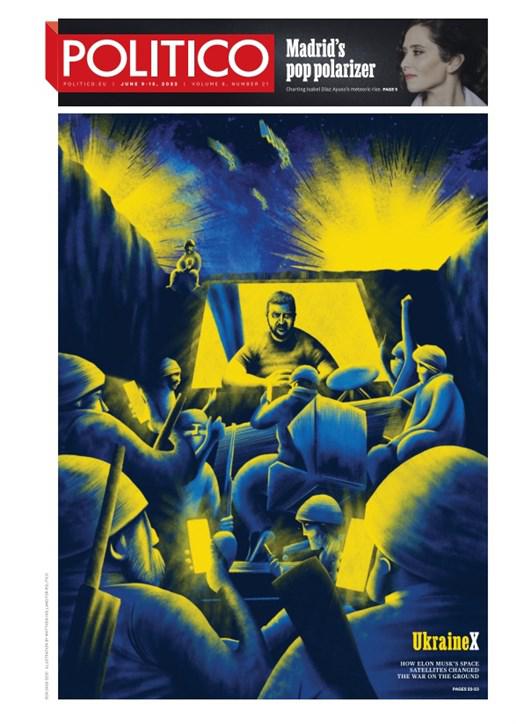Press play to listen to this article
Voiced by Amazon Polly
Presented by EPP Group.
By LILI BAYER
PRESENTED BY
Tips, tales, traumas to the POLITICO Brussels Team at @liliebayeror [email protected] | View in your browser
Good afternoon and welcome back to EU Influence.
ENERGY STORAGE PUSH: Four groups have written to EU institutions urging policymakers to lend political support for energy storage, alongside renewable energy.
War’s impact: “Russia’s invasion of Ukraine has exposed Europe’s fossil energy dependence,” wrote representatives of Breakthrough Energy, the European Association for Storage of Energy, SolarPower Europe and WindEurope. “We welcome the European Commission’s strategy to phase out Russian fossil fuel dependence through the REPowerEU plan.”
“What is urgently needed now,” the groups said, “is the massive and rapid roll-out of critical enabling technologies in the energy sector, notably energy storage solutions.”
**A message from the EPP Group: Follow the EPP Group Industry Days on 25th and 26th April. We will discuss with industry executives and business organisations how to build a unique approach for each ecosystem to achieve the EU's strategic autonomy and build our industries to be the most competitive and resilient in the world.**
Lobbies’ asks: “Energy storage encompasses a wide technology family, including mechanical, thermal, electrochemical, electrical, and chemical storage with timeframes ranging from milliseconds to inter-seasonal,” the groups wrote in a letter. The four organizations are asking the bloc to “set energy storage targets for 2030,” as well as “promote the uptake of energy storage technologies” and “mainstream energy storage in the European Commission’s implementation of the REPowerEU action plan and in the ongoing review of the Electricity Market Design.”
A GREEN MARSHALL PLAN FOR UKRAINE: The government in Kyiv is thinking about the future and that means reconstruction and the development of a Marshall Plan-type proposal to be presented to the EU and other allies. That presents an “amazing opportunity” to turn Ukraine into a green powerhouse, opposition MP and chair of the parliament’s climate committee, Lesia Vasylenko, told my colleague Karl Mathiesen.

The vision: Vasylenko wants Ukraine to rebuild its highly polluting industrial base to become the manufacturing engine of the EU Green Deal — where a postwar investment could be tailored to meet the industrial needs of this century. “We’re essentially going to be starting from scratch with the amount of destroyed industrial sites, energy sites. We can be the breeding ground for new technology for pilot projects, for renewables projects,” she said.
Planning underway: The office of President Volodymyr Zelenskyy and the chair of the parliament’s economic affairs committee Dmytro Natalukha are developing what Vasylenko called a “Marshall Plan for Ukraine,” with support from U.K. economists, she said. It’s her hope to influence that process and donor countries so that green spending “preconditions” are included. If that’s not imposed, she said, the country’s oligarchs and industrial captains will choose the cheapest, dirtiest options.
One way to get German attention: Vasylenko said she would be in Berlin next week, where she “definitely” wants to float her plan. For her, it represents a way to open discussions with a government that was “really reluctant” to help Ukraine. “But Germany is very keen on climate change, on greening the economy, on energy,” she said. “So the way that the war could be sold to them and that they needed to do something was actually through climate change.”
AROUND THE BUBBLE
LOBBYIST MOVES: Intel has hired Apple’s top Brussels lobbyist to woo European governments as the company ramps up its investment across the bloc, writes my colleague Pieter Haeck.
Hendrik Bourgeois will take on the role of vice president of European government affairs, Intel said in a statement shared with POLITICO. He will “advance Intel’s policy positions and government engagements across Europe.” Bourgeois has a long history of working for U.S. multinationals. Prior to the last two years as Apple’s head of government affairs for Europe and Russia, he worked for agricultural giant Cargill for a year after an 18-year stint with GE.
Intel’s new hire will have a full plate. The chipmaker in March pledged it would invest €17 billion in a new production site in Germany’s Magdeburg — a win for EU policymakers, as they eye boosting the bloc’s production capacity to 20 percent of the global market in 2030, up from 10 percent today. Other countries that would benefit from Intel’s plan to address the current chips shortage are France, Italy, Ireland, Poland and Spain.
Lawmakers, however, have raised concerns about how much state funding, from both EU and national budgets, will underpin Intel’s plans.
Intel is not the only chipmaker beefing up its presence in Brussels to keep a tab on the Chips Act, as both the European Parliament and Council start to mull the Commission’s proposal. Nvidia recently appointed Alberto Mittestainer, former deputy head of Sky’s EU office, to handle government relations for the EMEA region (Europe, Middle East and Africa) out of Brussels.
BEYOND BRUSSELS
POOR PERFORMANCE: NGO Freedom House has published its annual Nations in Transit report on the state of democracy from Central Europe to Central Asia, finding that 2021 “marks the 18th consecutive year of democratic decline for the region as a whole.” There are only six consolidated democracies left in the region, according to the report: the Czech Republic, Estonia, Latvia, Lithuania, Slovakia and Slovenia.
Autocracy and the in-between zone: “Increasingly, the countries of Central and Eastern Europe and Eurasia are headed toward two different destinations: the abyss of full-blown autocracy and the gray zone of hybrid governance, where ostensibly democratic structures belie undemocratic practices,” Freedom House concluded.
EU Influence? “The fact that no hybrid regime has reverted to authoritarianism,” according to the report, “is a testament to the abiding power of the liberal international order and the values it represents. In the case of Hungary and the hybrid regimes of the Western Balkans, the European Union (EU) remains an imperfect but important bulwark against precipitous democratic backsliding.”
**POLITICO Live’s Competitive Europe Summit is returning for a third edition on June 15-16! Join us for two days of compelling discussions on how Europe can improve its competitiveness on the world stage – from competition and trade policy to defense and digitalization – with a plethora of high-level speakers directly involved in the debate. Register here today.**
EU TRANSPARENCY
KREMLIN INFLUENCE IN FOCUS: The continued war in Ukraine is fueling frustrations about loopholes and lack of transparency in third-country lobbying. German Green MEP Daniel Freund told EU Influence in a statement that “there’s plenty of Russian money in Brussels trying to influence European politics in favor of Kremlin interest.”
“With all transparency we have in Brussels the exact number remains unknown. This is a problem,” Freund said, adding: “Foreign influence has to be made transparent. We cannot allow diplomatic immunity for third-country lobbyists. Whoever represents Russian interests in Brussels has to disclose how much money he or she receives for that from Moscow.”
TRANSPARENCY NUMBERS LATEST: Following the 2021 Interinstitutional Agreement on a mandatory Transparency Register, registrants had until March 19 to amend their registration in order to remain listed.
As of April 20, there are 12,059 registrants in the EU’s Transparency Register. The biggest group are nongovernmental organizations, platforms and networks, which represent approximately 28 percent of the total. Companies & groups make up 23 percent of the total, followed by trade and business associations, which constitute 22 entries in the register. Trade unions and professional associations represent 8 percent and professional consultancies about 5 percent.
**What do top French influencers have to say about France’s leadership in Europe? Join our stellar speaker lineup including MEP Manon Aubry, (La France Insoumise, GUE/GNL) and MEP Nathalie Loiseau (Renaissance, Renew Europe)at POLITICO Live’s event “After the French election: change or disruption” as they will discuss the outcomes of the French presidential election and the incoming “third round”: the legislative elections. Tune in on April 28 at 1:00 p.m. CEST. Register now!**
INFLUENCERS
Aurélie Bladocha Coelho has left FTTH Council Europe and will be joining Vantage Towers in May as the head of EU affairs and funding.
William Dazy, previously senior director at FTI Consulting, has joined Euros / Agency Group as deputy managing director based in Brussels.
Francesca Risso, currently a senior account manager for health affairs at FIPRA, will soon be moving to ResMed as a senior government affairs manager.
**A message from the EPP Group: The EPP Group wants European Industry to be the most competitive and resilient in the world. We support the ecosystems approach of the Industrial Strategy. The EU's global market position varies across ecosystems. Furthermore, digital and climate objectives will affect each ecosystem differently. The EPP Group is hosting an ‘Industry Days’ event to discuss with industry executives and business organisations how to efficiently facilitate the green and digital transition for the different ecosystems. The COVID-19 pandemic highlighted the urgency for a transformation in many industries. But now, Russia's war in Ukraine has accelerated the need. So, how to supply enough energy in the future? How to absorb the untapped potential of green energy? How can we build European industries to be the most competitive, resilient, and sustainable? Follow the LIVE debates with leading European industry representatives from all ecosystems during an EPP Group Industry Days event on 25-26 April.**
SUBSCRIBE to the POLITICO newsletter family: Brussels Playbook | London Playbook | Playbook Paris | EU Confidential | Sunday Crunch | EU Influence | London Influence | AI: Decoded | Digital Bridge | China Direct | Berlin Bulletin | D.C. Playbook | All our POLITICO Pro policy morning newsletters
More from ...Lili Bayer



